Protect Your eCommerce Business for Hurricane Irma and Other Disasters
Hurricane Irma is about four days out of becoming a major hurricane event for Florida. Those in the path of the storm in the Caribbean will feel the fury of the storm sooner.
Since I have lived in Florida, nine major categorized and named hurricanes have hit the state. That is beside a larger number of Tropical Storms and Tropical Depressions which can also create big problems. Of those major hurricanes, 7 had an impact on my area and businesses I was operating.
MAJOR STORM EVENTS ARE A YEARLY OCCURRENCE FOR ME
Almost annually, there is at least one tropical storm or hurricane that comes near me or affects my area in some way.
When most people hear of hurricanes and tropical storms, they think about the wind impact. The news media portrays hurricanes and tropical storms as “wind events.” While true, the real damage often comes from torrential rains and a storm surge resulting in significant flooding.
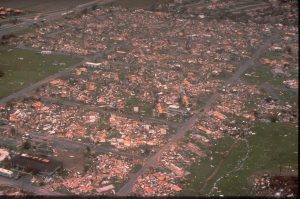
Since Hurricane Andrew in 1992, Florida has required stricter building codes for structures. Newer homes, offices, and warehouses are built with more wind resistance materials and improved structural designs.
Many residents also upgraded older homes with modern storm shutters. And they improved common weak areas such as garage doors and windows with hurricane rated materials.
While hurricane winds are still a big problem, more buildings now survive the actual wind phase of the storm.
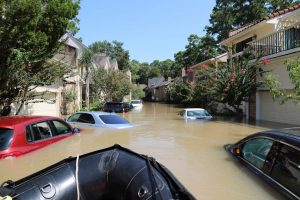
Unlike Houston, Texas, which has mostly a clay soil and does not drain well, most of Florida’s soil allows for better natural drainage. Thus, floods after major storms are shorter lived in Florida but are still as destructive as Hurricane Harvey’s flooding was in Texas.
As far as natural disasters, hurricanes have the advantage that you get a fair amount of warning. This warning time allows many people to prepare their home and business.
But even with all the technology and advances in forecasting, hurricane computer tracking models vary. Hence the National Hurricane Center publishes a forecast cone instead of a specific path.
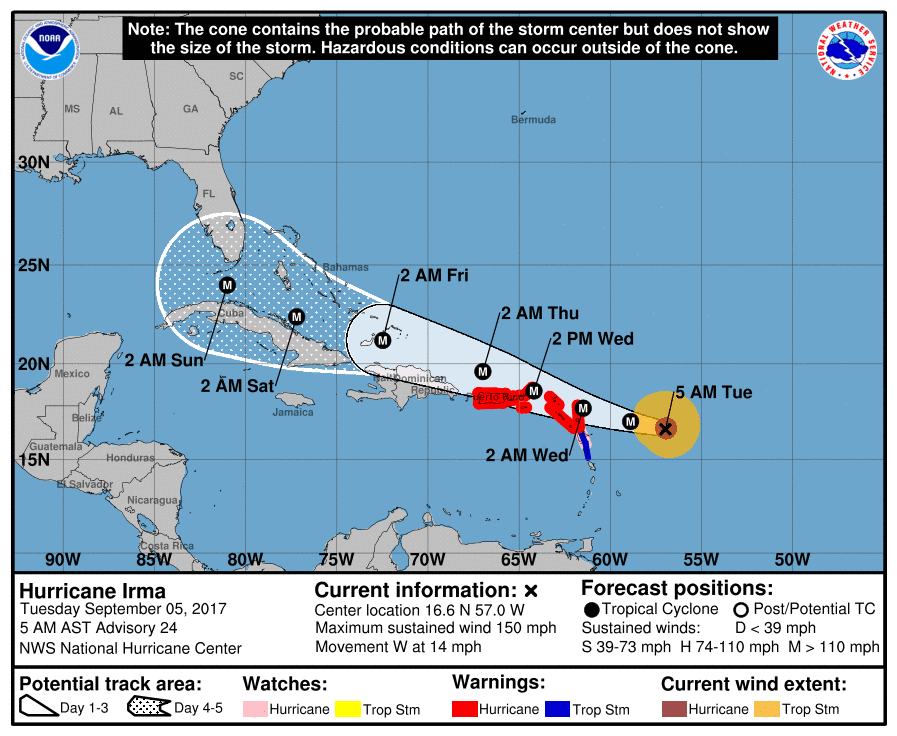
Hurricanes also have a “dirty side” which are more destructive. For Northern Hemisphere storms that is the right side in relation to the path. And size matters as large storms will impact a larger geographic area.
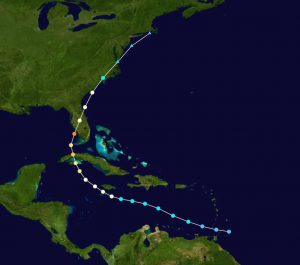
Even if the eye does not make landfall in Florida, a large hurricane that enters the Gulf of Mexico between Cuba and Florida is felt throughout the southern most populated areas of Florida.
A relatively benign looking Tropical Storm can strengthen to a major hurricane or make sudden significant course changes. Both can lead to unexpected changes in the scope and geographic impact of the storm.
Hurricane Charley in 2004 took an unexpected early sharp turn to the east, surprising many in the Punta Gorda/Charlotte area as the storm’s forecast had it making landfall in the Tampa Bay area.
SNOW STORMS, EARTH QUAKES, TORNADOES, WILD FIRES, AND OTHER DISASTERS
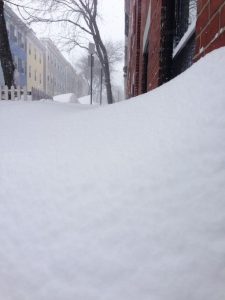
Regardless of the type of emergency. From natural disasters like snow storms, earthquakes, tornadoes, wildfires to accidents like gas leaks and pipe bursts, many such events can happen quickly with little warning.
Obviously, protecting your and your family’s life is paramount to any business interruption or damage to objects and structures.
But, at some point, you have to get back on your feet. You have to resume your daily routine.
And if you are an entrepreneur running your own business, you may have employees depending on your company to provide income.
This reality means a lot of pressure may rest on your shoulders to keep your business operational. The good news is that some simple basic practical tips can help get you up and running quickly.
PRACTICAL TIPS TO PREPARE FOR A DISASTER
Here is a list of useful tips to help your business survive many disasters. These tips deal with the operational aspects of your business. Protecting your physical office, warehouse, or home (if working from home) are outside the scope of this article.
- Write a disaster response plan. You don’t need a massive document detailing every little step, but a rough outline is fine.
- If you have a warehouse or office, contact your police and fire departments to ensure they have the correct contact information for you. You may want to update any records with other city and county departments as well.
- Scan or take pictures of every important document for your business. Store this information in the cloud or burn it to a DVD (or better yet do both). Protect your files stored in the cloud with a password. You can use open source compression utility 7-Zip to password protect individual or a group of files. It is best practice to do this during the year and not wait for a disaster. This way you always have the information available, no matter the circumstance.
- Here is a suggested list of documents you should store offsite:
- Articles of Incorporation and other legal documents that confirm the ownership of your business
- Business and Professional Licenses
- Vendor Contracts
- Insurance Documents
- Employee Records
- Financial Records
- Tax Returns
- Store invoices and other important paper documents in waterproof containers. You may need these to validate inventory value.
- Record a video and mention date in the video to show all your inventory and other business assets. Along with your vendor invoices, this will help confirm your insurance claim and get you up and running faster. Remember to store the video in the cloud and on a DVD or USB stick in a secure location.
- Confirm your insurance covers your inventory. Many eCommerce businesses outgrow their original inventory insurance. Also, many people do not carry flood insurance, yet floods can come from different sources and are very destructive. In short, get flood insurance.
- Physical backup of all your computer’s data should be a daily process. But in case you don’t do that, consider a cloud service like CrashPlan, Carbonite, or Backblaze.
- Double check your mobile plans include hotspot access. After a disaster, cell services are usually first to come back online, and you may have to run your eCommerce business from a laptop.
- Pre Record voicemail greetings stating a disaster impacts you. It is simpler to have these ready to go, then trying to record them after the disaster. Cell service may be spotty.
- Get a Power of Attorney to give a trusted family member, friend, or business associate temporary authority to handle your business affairs. A lot of legal documents may need to be executed after a disaster. If you are incapacitated, someone should be able to sign insurance, financial aid, and other legal documents to get your business up and running.
- Go to your bank and get some cash. Do not expect ATMs, Banks, or credit card machines to work. After the storms, if you need supplies to save your business, cash is still king!
CUSTOMER SERVICE AND LOGISTICS
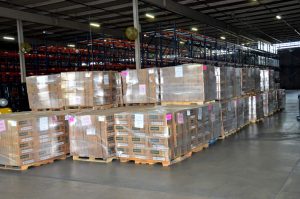
As we mentioned in the article about the impact of Hurricane Harvey, both customer service and logistics operations can be affected by flooding, loss of electricity, loss of communications services, and stoppage or repurposing of logistics assets.
Keep your customers in the loop about their orders. Explain to them that shipments may be delayed or tracking may be slow in updating due to system-wide backlogs.
Most customers will understand and as long as you keep communicating with them, you’ll be okay. And remember, if you sell on marketplaces, keep track of delayed shipments.
eBay and other marketplaces will offer automatic seller performance protection during major disasters, but you may still need to follow up with them on some orders.
IT IS NEVER TOO LATE TO MAKE A PLAN
Even if you are near the path of Hurricane Irma now, you still have time to prepare. Remember, prepare for the worst, hope for the best.
Fortunately, most of the time these preparations will not be necessary. But you will be glad if you need them when they become vital to get your business back on track.
If you have been through a disaster and have some additional tips, we love to hear them. Please use the comments section below.
If you liked this article and would like to engage with other small business entrepreneurs selling on marketplaces, join our [the_ad id=”41560″ inline =”1″]. You can also find us on [the_ad id=”41579″ inline =”1″], [the_ad id=”41573″ inline =”1″], [the_ad id=”41575″ inline =”1″], and [the_ad id=”41577″ inline =”1″] or sign up for our newsletter below.
SIGN UP. BE INSPIRED. GROW YOUR BUSINESS.
We do not sell your information. You can unsubscribe at any time.
Richard Meldner
Richard is co-founder of eSeller365. He has over 17 years of experience on eBay which includes tens of thousands of sales to buyers in over 100 countries and even has experience with eBay’s VeRO program enforcing intellectual property rights for a former employer. And for about two years Richard sold products on Amazon using Amazon FBA in the US.
To “relax” from the daily business grind, for a few weekends a year, he also works for IMSA as a professional race official.

